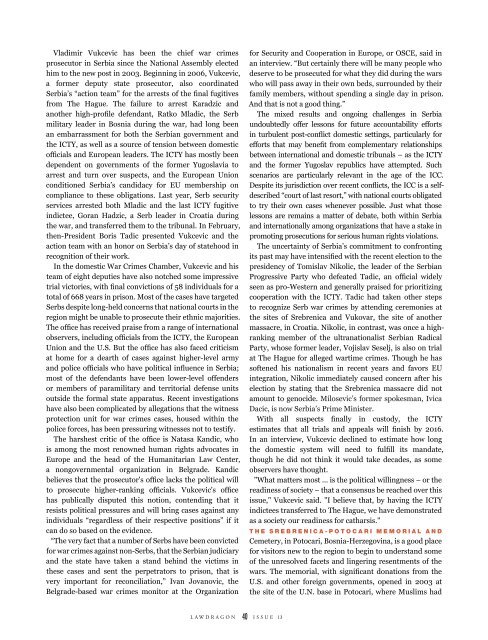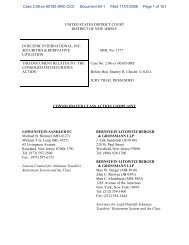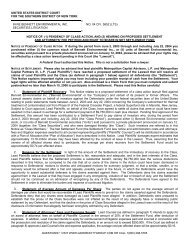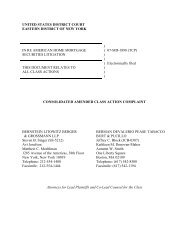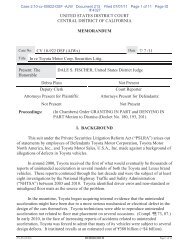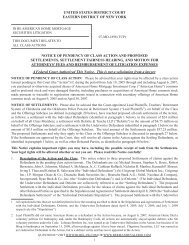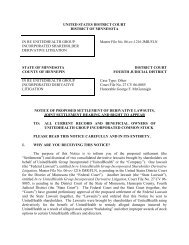to view the Lawdragon's - Bernstein Litowitz Berger & Grossmann LLP
to view the Lawdragon's - Bernstein Litowitz Berger & Grossmann LLP
to view the Lawdragon's - Bernstein Litowitz Berger & Grossmann LLP
You also want an ePaper? Increase the reach of your titles
YUMPU automatically turns print PDFs into web optimized ePapers that Google loves.
Vladimir Vukcevic has been <strong>the</strong> chief war crimesprosecu<strong>to</strong>r in Serbia since <strong>the</strong> National Assembly electedhim <strong>to</strong> <strong>the</strong> new post in 2003. Beginning in 2006, Vukcevic,a former deputy state prosecu<strong>to</strong>r, also coordinatedSerbia’s “action team” for <strong>the</strong> arrests of <strong>the</strong> final fugitivesfrom The Hague. The failure <strong>to</strong> arrest Karadzic andano<strong>the</strong>r high-profile defendant, Ratko Mladic, <strong>the</strong> Serbmilitary leader in Bosnia during <strong>the</strong> war, had long beenan embarrassment for both <strong>the</strong> Serbian government and<strong>the</strong> ICTY, as well as a source of tension between domesticofficials and European leaders. The ICTY has mostly beendependent on governments of <strong>the</strong> former Yugoslavia <strong>to</strong>arrest and turn over suspects, and <strong>the</strong> European Unionconditioned Serbia’s candidacy for EU membership oncompliance <strong>to</strong> <strong>the</strong>se obligations. Last year, Serb securityservices arrested both Mladic and <strong>the</strong> last ICTY fugitiveindictee, Goran Hadzic, a Serb leader in Croatia during<strong>the</strong> war, and transferred <strong>the</strong>m <strong>to</strong> <strong>the</strong> tribunal. In February,<strong>the</strong>n-President Boris Tadic presented Vukcevic and <strong>the</strong>action team with an honor on Serbia’s day of statehood inrecognition of <strong>the</strong>ir work.In <strong>the</strong> domestic War Crimes Chamber, Vukcevic and histeam of eight deputies have also notched some impressivetrial vic<strong>to</strong>ries, with final convictions of 58 individuals for a<strong>to</strong>tal of 668 years in prison. Most of <strong>the</strong> cases have targetedSerbs despite long-held concerns that national courts in <strong>the</strong>region might be unable <strong>to</strong> prosecute <strong>the</strong>ir ethnic majorities.The office has received praise from a range of internationalobservers, including officials from <strong>the</strong> ICTY, <strong>the</strong> EuropeanUnion and <strong>the</strong> U.S. But <strong>the</strong> office has also faced criticismat home for a dearth of cases against higher-level armyand police officials who have political influence in Serbia;most of <strong>the</strong> defendants have been lower-level offendersor members of paramilitary and terri<strong>to</strong>rial defense unitsoutside <strong>the</strong> formal state apparatus. Recent investigationshave also been complicated by allegations that <strong>the</strong> witnessprotection unit for war crimes cases, housed within <strong>the</strong>police forces, has been pressuring witnesses not <strong>to</strong> testify.The harshest critic of <strong>the</strong> office is Natasa Kandic, whois among <strong>the</strong> most renowned human rights advocates inEurope and <strong>the</strong> head of <strong>the</strong> Humanitarian Law Center,a nongovernmental organization in Belgrade. Kandicbelieves that <strong>the</strong> prosecu<strong>to</strong>r's office lacks <strong>the</strong> political will<strong>to</strong> prosecute higher-ranking officials. Vukcevic's officehas publically disputed this notion, contending that itresists political pressures and will bring cases against anyindividuals “regardless of <strong>the</strong>ir respective positions” if itcan do so based on <strong>the</strong> evidence.“The very fact that a number of Serbs have been convictedfor war crimes against non-Serbs, that <strong>the</strong> Serbian judiciaryand <strong>the</strong> state have taken a stand behind <strong>the</strong> victims in<strong>the</strong>se cases and sent <strong>the</strong> perpetra<strong>to</strong>rs <strong>to</strong> prison, that isvery important for reconciliation,” Ivan Jovanovic, <strong>the</strong>Belgrade-based war crimes moni<strong>to</strong>r at <strong>the</strong> Organizationfor Security and Cooperation in Europe, or OSCE, said inan inter<strong>view</strong>. “But certainly <strong>the</strong>re will be many people whodeserve <strong>to</strong> be prosecuted for what <strong>the</strong>y did during <strong>the</strong> warswho will pass away in <strong>the</strong>ir own beds, surrounded by <strong>the</strong>irfamily members, without spending a single day in prison.And that is not a good thing.”The mixed results and ongoing challenges in Serbiaundoubtedly offer lessons for future accountability effortsin turbulent post-conflict domestic settings, particularly forefforts that may benefit from complementary relationshipsbetween international and domestic tribunals – as <strong>the</strong> ICTYand <strong>the</strong> former Yugoslav republics have attempted. Suchscenarios are particularly relevant in <strong>the</strong> age of <strong>the</strong> ICC.Despite its jurisdiction over recent conflicts, <strong>the</strong> ICC is a selfdescribed“court of last resort,” with national courts obligated<strong>to</strong> try <strong>the</strong>ir own cases whenever possible. Just what thoselessons are remains a matter of debate, both within Serbiaand internationally among organizations that have a stake inpromoting prosecutions for serious human rights violations.The uncertainty of Serbia’s commitment <strong>to</strong> confrontingits past may have intensified with <strong>the</strong> recent election <strong>to</strong> <strong>the</strong>presidency of Tomislav Nikolic, <strong>the</strong> leader of <strong>the</strong> SerbianProgressive Party who defeated Tadic, an official widelyseen as pro-Western and generally praised for prioritizingcooperation with <strong>the</strong> ICTY. Tadic had taken o<strong>the</strong>r steps<strong>to</strong> recognize Serb war crimes by attending ceremonies at<strong>the</strong> sites of Srebrenica and Vukovar, <strong>the</strong> site of ano<strong>the</strong>rmassacre, in Croatia. Nikolic, in contrast, was once a highrankingmember of <strong>the</strong> ultranationalist Serbian RadicalParty, whose former leader, Vojislav Seselj, is also on trialat The Hague for alleged wartime crimes. Though he hassoftened his nationalism in recent years and favors EUintegration, Nikolic immediately caused concern after hiselection by stating that <strong>the</strong> Srebrenica massacre did notamount <strong>to</strong> genocide. Milosevic’s former spokesman, IvicaDacic, is now Serbia’s Prime Minister.With all suspects finally in cus<strong>to</strong>dy, <strong>the</strong> ICTYestimates that all trials and appeals will finish by 2016.In an inter<strong>view</strong>, Vukcevic declined <strong>to</strong> estimate how long<strong>the</strong> domestic system will need <strong>to</strong> fulfill its mandate,though he did not think it would take decades, as someobservers have thought."What matters most ... is <strong>the</strong> political willingness – or <strong>the</strong>readiness of society – that a consensus be reached over thisissue," Vukcevic said. "I believe that, by having <strong>the</strong> ICTYindictees transferred <strong>to</strong> The Hague, we have demonstratedas a society our readiness for catharsis."T h e S r e b r e n i c a - P o t o c a r i M e m o r i a l a n dCemetery, in Po<strong>to</strong>cari, Bosnia-Herzegovina, is a good placefor visi<strong>to</strong>rs new <strong>to</strong> <strong>the</strong> region <strong>to</strong> begin <strong>to</strong> understand someof <strong>the</strong> unresolved facets and lingering resentments of <strong>the</strong>wars. The memorial, with significant donations from <strong>the</strong>U.S. and o<strong>the</strong>r foreign governments, opened in 2003 at<strong>the</strong> site of <strong>the</strong> U.N. base in Po<strong>to</strong>cari, where Muslims hadL A W D R A G O N 40 I s s u e 13


